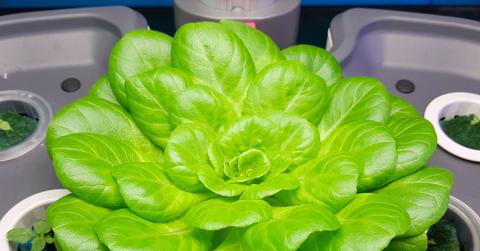Pratt Students Design The Waste-Free Kitchen Of The Future
Pratt Institute students have designed "The Future Kitchen," an innovative cooking and eating space that makes its own food and energy, and produces zero food or water waste, making it an eco-friendly home upgrade.
Updated Nov. 19 2020, 9:41 p.m. ET
The future of kitchens will be their role in arming us as self-sufficient eaters. Almost half of all food in the United States is wasted every year, with one in every six people unsure of where their next meal will come from. In 2013 alone, the food wasted added up to an unconscionable 37 million tons. The average item in a supermarket as traveled more than 1,500 miles to reach you.
Some of the food waste in this country is due to supermarkets tossing blemished produce and doing away with other products that stretch past their “use by” dates. But a big part of the responsibility rests on consumers’ shoulders. Our kitchens are huge sources of waste: where we toss leftovers, leave things in inefficient refrigerators uneaten, and can’t seem to figure out portions or meal-planning so a lot of what we buy ends up in the trash.
Which brings us to “The Future Kitchen,” a design idea installed for WantedDesign Manhattan that is the result of a collaboration between New York architect , Pratt Institute design students, and Caeserstone.
With Thorpe’s guidance, the students explored sustainable solutions for kitchens that include the potential for residents to grow and store their own food, leaving nothing to waste. The result is a page pulled from science fiction: an image of a kitchen that could be in homes in the year 2050, when at least 80 percent of the population worldwide is expected to be living in cities. WantedDesign, where the kitchen was installed, was founded in 2011 to promote international design focused on innovation.
The project combines multiple technologies for a structural kitchen that promises to solve the biggest sources of kitchen waste: food matter, energy loss through inefficient appliances, and water waste.
This kitchen turns food to fuel.  
If you hadn’t already heard, composting your food scraps is one of the simplest ways to keep organic waste out of landfills.
Well now there’s another way to avoid food ending up in the waste stream: use it for fuel.
The Future Kitchen turns food scraps into biogas to fuel the cooking surfaces and oven. Its design is based around a central hearth, encouraging the kitchen-as-gathering-place concept. That hearth is also a food-waste disposal site. Its chute runs directly to a biogas generator—and, for all the tech nerds out there, a 3D printer.
No more cooktop requiring outside energy. No more energy-zapping refrigerator. And no more wasted food.
In the future, water waste will be a thing of the past. 
Kitchens are huge sources of waste, with black water, food scraps, and dishwash liquid flowing down the drain and directly to septic or sewer systems. Well, maybe not for long—The Future Kitchen uses stream automation to reduce the amount of water you use, then filters the water and recycles it for hydroponic and aquaponic systems that will be growing all your own produce and fish.
The Future Kitchen is built to last. 
The Future Kitchen’s food prep area is built with Caesarstone quartz, which is heat- and cold-resistant, bacteria-, mold- and mildew-free due to its non-porous surface.
An induction cooktop with smart technology, dining area, and storage round out the futuristic space.
